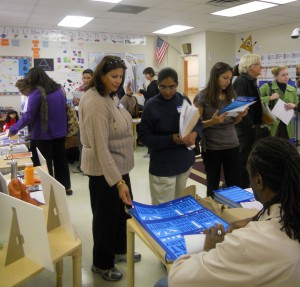By Amissah Seals, ELEV8 Program Manager
Though Perspectives Middle Academy (PMA) encourages its scholars to live healthy lifestyles by providing fresh healthy lunches and enacting a no soda machine policy, many of our scholars still struggle with obesity. There are also a high number of students with diabetes and other illnesses that are closely linked to how and what we eat. Even with a “no soda policy” water is not always the first choice when picking a beverage. Many of the juices and sports drinks that our scholars have access to are loaded with sugar. We wanted to show our scholars that a small change to their diet could improve their energy, help them lose weight and become more active. What better way than through simply drinking more water! With support from CLOCC as a part of the Healthy Schools Initiative focused on creating healthier school environments, ELEV8 embarked on a campaign to get our scholars to drink more water.
On February 28, we kicked off the ELEV8 at PMA Water Challenge with a lively pep rally! The scholar Health Ambassadors made a presentation called “WHY WATER?” They spoke earnestly with their fellow scholars about the health benefits of water and why we felt the need to try to challenge the PMA student body to drink more water. They explained that the challenge would last 10 weeks. We showed a video featuring Mrs. Michelle Obama extolling the virtues of water and our PMA Warriors cheerleading team lead us in a few cheers to get the scholars excited about the challenge ahead.
Our goal was to increase students’ and faculty members’ water intake by 48 ounces a day. We started by purchasing two cold filtered water machines. This move alone had the entire Perspectives Auburn Gresham campus excited! One of the many complaints we heard when asking students about why they did not drink the water available to them in the cafeteria or in the regular water fountains was the taste and that it was never cold! In addition, we purchased water bottles for the entire student body, faculty and staff. There were no excuses not to get your daily dose of fresh clean water. Our health ambassadors hung the marketing materials and made daily reminders during advisory periods. Ultimately we hoped to increase our schools water intake by 760,000 ounces by the end of the 10 week challenge.
The stage was set, but we met a few challenges along the way. One of the major problems we encountered was how to record the amount of water each student drank. We settled on an “honor system” where students added multicolored stickers to large bulletin boards placed near each water machine and in the cafeteria. Another issue we faced was the scholars losing water bottles.
For the most part our challenge went quite well. With the guidance of our health coordinator, Anya Cawthon, the PMA Health Ambassadors presented during lunch time and during “A Disciplined Life” (ADL) classes, reminding students of the benefits of drinking more water and living a healthy lifestyle. Though we fell slightly short of our 760,000 ounce goal, we managed to have nearly 80% of the student body retain their water bottles for the remainder of the school year. We also inspired both of the high schools to plan a water challenge for the Fall of 2014. A lasting effect of the water challenge is that Perspectives Auburn Gresham Campus will have access to cold filtered water for years to come.
From Michelle Hill – 6th grade student at Perspectives Middle Academy:
I am a sixth grade scholar here at Perspectives Middle Academy. Ms. Cawton asked me to join the Health Ambassadors to help give me some focus. At first I was scared to talk in front of the whole school about drinking water. I thought that they would not listen to me because water isn’t that interesting. Then we started learning about how water can help you stay healthy. Our school really likes to be competitive and do challenges against the other classes. I thought I would really like to help my advisory win the challenge.
The hardest part was getting all the scholars to remember to bring their water bottles with them every day. By the middle of the challenge I really started to like drinking water more. Especially when we could sometimes add lemon juice! I think the Water Challenge was really fun, and we should do it again next year!











